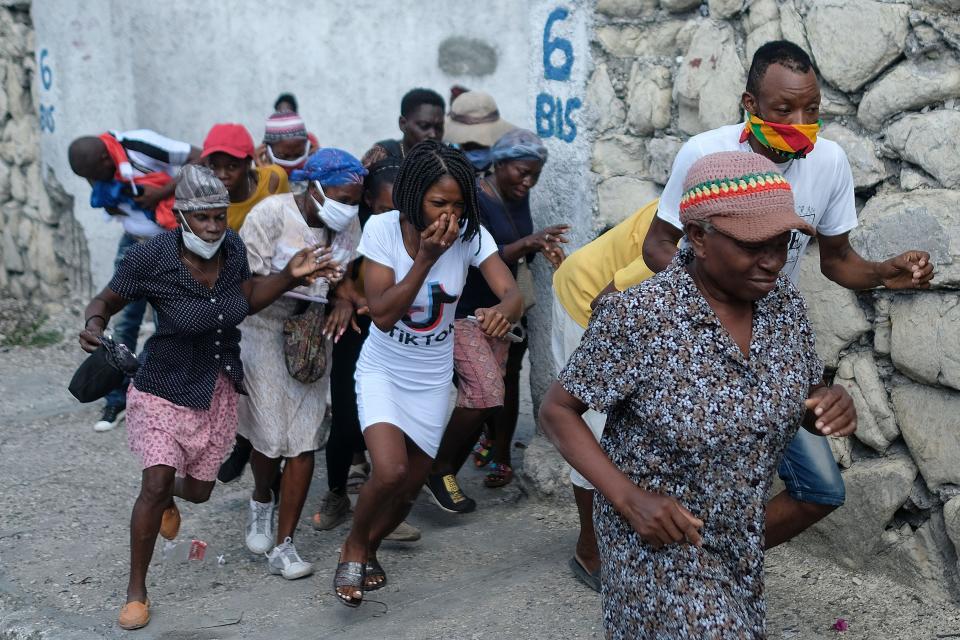Haiti's 'descent into hell': Kidnappings, gangs ran rampant well before the spotlight on American missionaries
PORT-AU-PRINCE, Haiti – Naïza Fadianie Saint Germain was steps from her home in Croix-des-Bouquets when she was kidnapped in August.
"During the days of my abduction, my eyes were blindfolded. I didn't shower. All of my humanity was on its knees," the 25-year-old told USA TODAY. "They give me food, but they treat me like cattle. I was scared. I saw death in the face."
Saint Germain, an actress and student, said she was verbally and physically assaulted before being released after five days. Since then, she has been living in isolation.
"I can't get out. I still feel in danger," she said.
The world now knows the 400 Mawozo gang, one of the most powerful in Haiti, after it kidnapped one Canadian and 16 American missionaries, along with a local driver, and demanded a $17 million ransom. But at the commune of Croix-des-Bouquets, bandits terrorizing the population has become part of daily life.

Bold criminal activity was rampant even before the assassination of President Jovenel Moïse at his home in July, but gangs have become more brazen since. That crisis, along with an earthquake in August that killed more than 2,200 people and destroyed more than 130,000 homes, has fueled a near-total collapse of civil order.
At least 119 kidnappings were recorded in Haiti for the first half of October, according to the Center of Analysis and Research of Human Rights, a local nonprofit group.
In response to the kidnappings and the assassination, Haitians staged strikes and protests Monday through Wednesday.
On Tuesday, White House press secretary Jen Psaki said the FBI was “part of a coordinated U.S. government effort” to rescue the missionaries. What is not known is the conditions under which the American and Canadian missionaries are being held or how they are being treated.
“We know these groups target U.S. citizens who they assume have the resources and finances to pay ransoms, even if that is not the case,” Psaki said. She noted that the government has urged U.S. citizens not to visit Haiti.
It is longstanding U.S. policy not to negotiate with hostage takers.
Saint Germain says her family's savings were spent to free her. But some victims refuse to pay ransoms, such as the Protestant Federation of Haiti.
"Today the target of the kidnappers are the churches. People have been kidnapped during worship, weddings and funerals," said Pastor Calixte Fleuridor, president of the group. "I know pastors who are afraid of giving funerals ... for fear of being kidnapped."
The kidnappers often dress in police uniforms, which strikes even more fear into the population, Fleuridor said. “Life has become more difficult in Haiti. It is the descent into hell."
Jean Kenny Berthaud, 29, a customs officer in Port-au-Prince, said his friend Asnel Marcelin was kidnapped in such a way.
“The bandits were wearing uniforms from the central management of the Haitian judicial police. They kidnapped him in broad daylight," Berthaud said. "Today the family is traumatized and ruined" from paying the ransom, he said.
While the world seems to have just awoken to the kidnappings, Saint Germain said, they have been a problem since 2019.
"The streets of Port-au-Prince are becoming a really dangerous place. How can they have elections with so much insecurity? ... The situation is just unbearable in Haiti," she said. "The victims are not only those who were kidnapped but their families as well. We are all suffering from the situation under the silent gaze of the international community."
This article originally appeared on USA TODAY: Haiti kidnapping problem existed before the American missionaries

 Yahoo Movies
Yahoo Movies 
